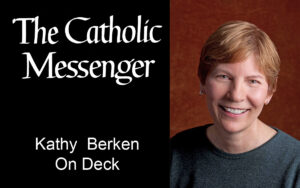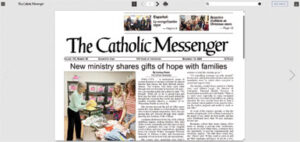 By Kathy Berken
By Kathy Berken
On Deck
Decades ago, I attended a social-justice-immersion retreat in Rochester, New York, and participated in a prayer service with recently paroled convicts living at a halfway house a local parish sponsored. One of the men had a gash on his forehead from a knife fight, and he was ashamed of it. I walked over, knelt next to him and traced a vertical line through the scar and offered a quiet blessing.
Years later, a man I worked with wanted to find a priest to bless his children, even though they were baptized. I said, “Bob, you can bless your children yourself.” His hesitation made me wonder if he thought his blessing could not be as meaningful as a priest’s. But we know that clergy and religious alike encourage families to bless each other by tracing the cross on their foreheads and offering a simple prayer such as, “May God bless you this day and always.”
My pre-Vatican II Catholic upbringing taught me that blessings involved the sign of the cross, which is repeated at the end of every Mass when the celebrant blesses us in the name of the Father and of the Son and of the Holy Spirit.
My late friend Lee Nagel, a national leader in Catholic education, always signed his notes and letters with “Blessings, Lee.” No one else I knew did that, and, frankly, I found it disconcerting because it seemed too holy for a funny greeting card.
After Lee died in 2014, I began noticing friends in his circle signing their cards the same way. I still couldn’t follow suit when it still seemed overly pious, especially in a note thanking a friend for the six-pack of hot sauce.
However, my attitude changed when I was in a Zoom class for “Growing in Wisdom,” the spirituality-of-aging program I described last month. In Father Ron Rolheiser’s presentation on blessings, he invited us to be grateful, forgive, ask for forgiveness, and to say “I love you” often. These actions are blessings, he said, and when one of the participants asked how she could bless her non-religious friend, he said she doesn’t have to use the word “blessing” or use religious gestures or symbols, but in telling her friend that she appreciates her and is happy they are friends is, indeed, a blessing.
Jesus blessed people all the time, and he wasn’t making the sign of the cross when he did it, because that would just be weird! He healed the sick, forgave sinners, welcomed the stranger, fed the hungry, taught with kindness, and loved everyone.
Coincidentally, the night before the Zoom class, I had called my son, Aaron, about my being a victim of an online scam. Aaron is a computer engineer and expert in all things digital. After my lengthy explanation, I asked him if there was anything more I needed to do. He listened patiently, and never once said or even implied, “Mom, you should have known better!” He affirmed and encouraged me and suggested we keep in touch. Feeling foolish about my being suckered, he said, “Scammers are so much more sophisticated these days.”
Aaron blessed me without even knowing it. He did not shame me, but his patience, understanding, and knowledge were gifts to my emotional turmoil of fear and regret.
The favors we perform, the benefit of the doubt we offer others, the small gestures of kindness we show are all blessings without the cross.
If you have been reading these columns for a while, you know that I discover God’s presence in everyday situations, aim to connect the sacred with the secular, and recognize that the good we do are true and holy blessings that further the Kingdom of God on earth.
(Kathy Berken is a spiritual director and retreat leader in St. Paul, Minnesota. She lived and worked at L’Arche in Clinton — The Arch from 1999-2009.)









